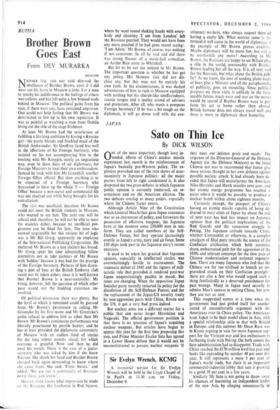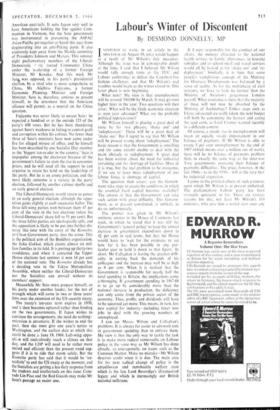Sato on Thin Ice
JAPAN
By DICK WILSON
ONE of the most important, though least in- tended, effects of China's nuclear missile experiment last month is the reinforcement of Japan's basically pro-Western policy. The ex- plosion provoked one of the rare shows of near- unanimity in Japanese politics: all the major parties from left to right condemned it. It also deepened the two great debates in which Japanese public opinion is currently immersed, on re- armament and on the American alliance. The two debates overlap at many points, especially where the Chinese factor enters.
Although Article Nine of the Constitution which General MacArthur gave Japan renounces war as an instrument of policy, and forswears the possession of offensive weapons, the Japanese have at the moment some 250,000 men in uni- form. They are called members of the Self- Defence Forces, but they operate increasingly overtly as Japan's army, navy and air force. Some 150 ships took part in the Japanese navy's recent exercises.
It used to be taken for granted that Japanese opinion, especially in intellectual circles, was overwhelmingly hostile to rearmament. The traumatic defeat of 1945 and the rigours of mili- taristic rule that preceded it rendered post-war Japan unquestioningly pacifist in mood. But times are changing. When the opposition Japan Socialist party recently restarted its policy for the dissolution of the Self-Defence Forces, and for the replacement of the Japan-US security treaty by non-aggression pacts with China, Russia and the US, it got a very bad press indeed.
But nuclear arms are a different matter for a public that can never forget Hiroshima and Nagasaki. The official government position is that there is no question of Japan's acquiring nuclear weapons. But articles have begun to appear this year for the first time proposing this step, and Prime Minister Eisaku Sato has agreed in a Lower House debate that it would not be unconstitutional to possess nuclear weapons `if they meet our defence goals and needs.' The response of the Director-General of the Defence Agency (i.e. the Defence Minister) to the latest Chinese test was to recommend that Japan give more serious thought to her own defence against possible nuclear attack. It had already been de- cided that Japan will manufacture the American Nike-Hercules and Hawk missiles next year, and her atomic energy programme has reached a point where it would be possible to produce a nuclear bomb within about eighteen months.
Curiously enough, the prospect of China's having an atomic missile capable of being de- livered to most cities of Japan by about the end of next year has had less impact on Japanese opinion than the political implications of the Red Guards and the succession struggle in Peking. The Japanese attitude towards China, whether Communist or otherwise, is a complex amalgam of filial piety towards the source of the Confucian civilisation which both countries share, embarrassed guilt for the aggression of the 1930s and tolerant contempt for the slow pace of Chinese modernisation and national regenera- tion. There are many Japanese who feel that the Chinese are far too civilised to launch an un- provoked attack on their Confucian protégés : there are also a few who would regard such a thing fatalistically as a deserved punishment for past wrongs. Many in Japan used secretly to admire Mao's success in uniting China, but now they are not so sure.
This reappraisal comes at a time when the government had just girded itself for another round of uncomfortable argument with the Americans over its China policy. The Americans want Japan to be their model client in Asia, with a special relationship akin to that -with Britain in Europe, and this summer Mr Dean Rusk was in Kyoto arguing in vain for more Japanese sup- port for the Vietnam war and less enthusiasm in furthering trade with Peking. On both counts the Sato administration had to disappoint. Trade with China reached the £170-million level last year and looks like expanding by another 40 per cent this year. It still represents a mere 3 per cent of Japan's world trade, but there is an important commercial-industrial lobby that sees it growing to a good 10 per cent in a few years.
Similarly Mr Sato is not going to throw away his chances of becoming an independent leader of the new Asia by clinging unnecessarily to American coat-tails. It suits Japan very well to have Americans holding the line against Com- munism in Vietnam, but the Sato government was instrumental in preventing the ASPAC Asian-Pacific get-together at Seoul this year from degenerating into an anti-Peking party. It also studiously kept away from the Manila summitry of Presidents Johnson and Marcos. This summer eight parliamentary members of the Liberal- Democratic r rty toured Communist China under the leadership of a former Foreign Minister, Mr Kosaka. And this week Mr Sat% was opposed, in his party's presidential eledion, by a rival who is more sympathetic to China, Mr Aiichiro Fujiyama, a former Economic Planning Minister and Foreign Minister. Sato is, therefore, anxious to present himself, to the uttermost that the American alliance will permit, as a neutral on the China question.
Fujiyama was never likely to unseat Sato : he expected a hundred or at the outside 125 of the party's 450 votes. But he has been thundering against Sato's weakness in failing to control graft and corruption within his cabinet. No fewer than three of Sato's ministers have now come under fire for alleged misuse of office, and he himself has been described by one Socialist Diet member as the 'biggest tax-evader in the country.' Sato is unpopular among the electorate because of the government's failure to stem the rise in consumer prices, and he will need all the support he can organise to retain his hold on the leadership of the party. But he is an astute politician, and the most likely outcome is a victory in the party election, followed by another cabinet shuffle and an early general election.
The Liberal-Democrats would return to power in an early general election, although the oppo- sition gains slightly at each successive ballot. The three left-wing parties won between them 47 per cent of the vote in the last elections (when the Liberal-Democrats' share fell to 51 per cent). But the three leftist parties are ideologically split, and the opposition is likely to be put into further dis- array this time with the entry of the Komeito, or Clean Government party, into the arena. This is the political arm of the Buddhist organisation, the Soka Gakkai, which claims almost six mil- lion families in its fold. It is putting up thirty-two candidates, and when it contested the Upper House elections last summer it won 14 per cent of the national vote. The Komeito already has a deciding vote in the Tokyo Metropolitan Assembly, where neither the Liberal-Democrats nor the Socialists can prevail without its members' support.
Meanwhile Mr Sato must prepare himself, or his party under another leader, for the test of strength which will come in two or three years' time over the extension of the US security treaty.
The treaty's ten-year term expires in 1970, and it then becomes optional rather than binding on the two governments. If Japan wishes to continue the arrangements, she need do nothing: extension is automatic. If she wishes to end the pact, then she must give one year's notice to Washington, and the earliest date at which this could be done is June 19, 1969. Left-wing oppo- sitiJn will undoubtedly reach a climax on that day, and the LDP will need to be rather more united and efficient than the present trend sug- gests if it is to ride that storm safely. But the Komeito party has said that it would be 'un- realistic' to end the US treaty at the moment, and the Socialists are getting a less fiery response from the students and intellectuals on this issue. Com- rade Lin Piao and the Red Guards may make Mr Sato's passage an easier one.



































 Previous page
Previous page